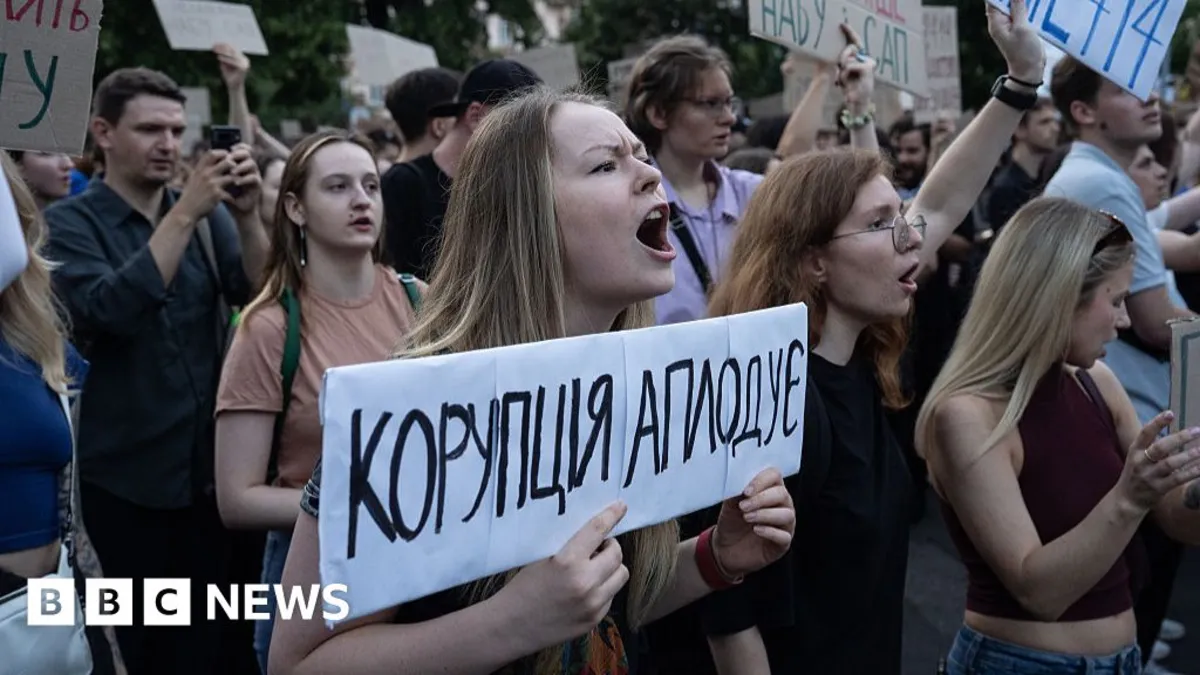
In a significant political move, Ukraine's President Volodymyr Zelensky has signed a controversial bill that critics argue undermines the independence of the nation’s key anti-corruption institutions. This legislative action has ignited widespread protests across the country and attracted sharp criticism from international observers.
Opponents of the new law contend that it effectively diminishes the authority of the National Anti-Corruption Bureau (Nabu) and the Specialised Anti-Corruption Prosecutor's Office (Sapo), placing them under the control of the prosecutor general. In a public address, President Zelensky assured citizens that both agencies would continue to operate but emphasized the need to purge them of alleged Russian influence.
The passage of this bill led to one of the largest anti-government protests in Kyiv since the onset of Russia's full-scale invasion in February 2022. Demonstrators also took to the streets in major cities including Lviv, Dnipro, and Odesa. Protest signs expressed sentiments such as "We chose Europe, not autocracy," with one demonstrator poignantly stating, "My father did not die for this."
The new legislation allows Ukraine's chief prosecutor, a loyalist of Zelensky, Ruslan Kravchenko, to reassign corruption investigations to potentially more compliant investigators or even to close them altogether. In his speech, Zelensky criticized the current state of Ukraine's anti-corruption efforts, claiming that numerous cases involving billions of dollars have remained unresolved for years. He asserted that the prosecutor general would be responsible for ensuring that lawbreakers face consequences.
However, many critics argue that this move contradicts more than a decade of pro-democracy and anti-corruption initiatives, which were pivotal in the Euromaidan uprising and the subsequent removal of the pro-Russian president, Viktor Yanukovych, in 2014. These efforts came in response to Russia's aggression and have been instrumental in shaping Ukraine's political landscape.
The Ukrainian government has cited a need to curtail Nabu's powers due to purported Russian infiltration. Notably, the day before the controversial law was enacted, Ukraine's Security Service and the prosecutor general's office conducted searches and arrests targeting individuals suspected of being Russian spies within Nabu. This action has raised alarm among Ukraine's Western allies.
Western nations, particularly the European Union, have a vested interest in Ukraine's anti-corruption framework, which was established under their guidance a decade ago as a condition for financial aid and enhanced diplomatic relations. EU spokesperson Guillaume Mercier expressed concerns about the recent legislative changes to Ukraine's anti-corruption institutions, which are seen as critical to the nation’s journey toward EU membership.
The European commissioner for enlargement, Marta Kos, condemned the adoption of the bill, stating that dismantling vital safeguards for Nabu's independence represents a significant regression. She emphasized the importance of these institutions for Ukraine's EU aspirations.
Additionally, ambassadors from the G7 nations have signaled their intention to engage with Ukrainian leaders regarding the pressures facing Nabu and Sapo. Despite these concerns, it appears that Ukraine's allies may hesitate to withdraw aid and cooperation, especially as the country continues to face challenges on the frontline against Russian aggression.
The recent legislative changes in Ukraine have ignited a crucial debate about the future of its anti-corruption efforts and the potential implications for its international partnerships. With the country caught in a complex struggle against external aggression and internal governance challenges, the path ahead remains fraught with uncertainty.